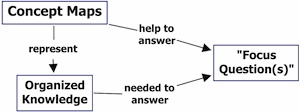 If you are like most Div III students, your committee is telling you that you have to focus your topic more, that the project is too big as it stands. You might be wondering how a more focused project will allow you to still hold onto the larger issues that brought you to your Div III.
If you are like most Div III students, your committee is telling you that you have to focus your topic more, that the project is too big as it stands. You might be wondering how a more focused project will allow you to still hold onto the larger issues that brought you to your Div III.
For a written Div III, you often begin with an introduction that lays out the bigger “problem” or issue. This is where you write about the big ideas. It might take a few pages to do that. Since you are dealing with a large problem at first, you’ll note that there is more than one way to approach it (that is why it is a big, unstructured problem). Keep in mind that you can’t solve BIG issues in one project – not in any project, but especially one done in, say, 7 months (we’d be willing to have you stay longer, but you’ll probably want to focus instead).
So, you’ll have to figure out your purpose. This is where you funnel down from the big issue and figure out your research questions or specific goals of the project. You’ll select methods that help you accomplish that goal or answer those questions.
But don’t despair, after you are done you bring what you learned back to bear on the larger issue in your conclusions or generalizations section or chapter. You didn’t fix the whole problem, but you’ll have something important to say about the problem. This is your contribution to the larger understanding.
If you are doing a creative project, you still might be doing so because of a larger issue or unsolved problem (maybe about how to accomplish something). You will still have your methods and your take on the issues with your own creative contribution.
Save
Save




